 Amazing cliff diving in cold winter
Amazing cliff diving in cold winter
 Enjoy Sochi 2014 in slow motion
Enjoy Sochi 2014 in slow motion
 University student sentenced to death for poisoning roommate
University student sentenced to death for poisoning roommate
 Chinese lunar New Year celebrated in San Francisco
Chinese lunar New Year celebrated in San Francisco
 Taiwan Lantern Festival 2014
Taiwan Lantern Festival 2014
 Haiyang Yangge: make up
Haiyang Yangge: make up
 China's top 10 richest cities
China's top 10 richest cities
 President Xi visits garrison troops in Inner Mongolia
President Xi visits garrison troops in Inner Mongolia
 Turnip sculptures amaze tourists in Qingdao
Turnip sculptures amaze tourists in QingdaoSEOUL, Feb. 20 -- The first reunion of families separated by the Korean War in more than three years began on Thursday afternoon in the Democratic People's Republic of Korea ( DPRK)'s Mount Kumgang resort.
The 82 elderly South Koreans, four-fifths of them over 80, reunited with 178 of their long-lost relatives from the DPRK for the first time in six decades. The mass gathering, the first event for the three-day reunion, began at 3 p.m. local time as scheduled, according to Seoul's Unification Ministry.
At 8:20 a.m., the frail South Koreans, including two in ambulances and 19 in wheelchairs due to health problems, left a resort hotel in the country's east coastal city of Sokcho, where they received medical check-up and training on the dos and don'ts during their stay in the DPRK the previous day.
The South Korean participants crossed the inter-Korean border by bus at 11:04 a.m. and arrived at the reunion venue at about 1 p. m., according to a pool report published by the ministry.
A convoy of 10 coaches, carrying the South Korean elderly accompanied by 58 family members for physical support, drove some 80 kms along the snow-covered roadside, trailed by three ambulances, five passenger cars as escorts and one truck.
South Korean standers-by waved to the old men and women heading to the scenic Mount Kumgang resort where they will meet their DPRK relatives separated for six decades by the three-year Korean War that ended in armistice in 1953.
After the first group meeting that lasts for two hours through 5 p.m., families from the two Koreas will participate in the welcoming dinner hosted by the DPRK for two hours from 7 p.m.
The next day, three meetings will be staged, including private meeting, group lunch and mass gathering for two hours each.
On the third and final day of the brief reunion, the divided families will reunite for just one hour to bid farewell to their relatives, an expected tearful scene, before South Koreans return to the Sokcho resort at about 4 p.m.
Under the same schedule, the second three-day reunion will be held from Sunday when 88 DPRK applicants will reunite with 372 family members from the South.
The 19th round of reunion, the first such humanitarian event since November 2010, came after top DPRK leader Kim Jong Un voiced his willingness to improve relations with South Korea in his New Year's speech.
In response to Seoul's call for sincerity with action, Pyongyang agreed to hold the family reunion as scheduled as the first step toward mending ties, though the annual South Korea-U.S. joint military exercises is scheduled to begin on Feb. 24, which the DPRK had urged Seoul to cancel or delay what it denounced as the rehearsal for a northward invasion.
Despite the humanitarian event launched as scheduled, urgency for frequent reunion is growing given the fast aging of members of the divided families.
Almost half of 129,264 South Koreans, who had applied for reunion since 1988, died without chance of meeting their long-lost relatives, according to the government data.
The applicants were aging rapidly, with 80 percent of the survivors older than 70. The applicants aged 80 and above account for 52.8 percent of the total at the end of 2013, up from 20.3 percent 10 years earlier.
The private Hyundai Research Institute forecast that all the separated families will pass away within 20 years given their average life expectancy, saying that the two Koreas should stage a large-scale extra reunion for those older than 80.
Family reunion center in Mount Kumgang should be constantly opened for active meetings, and at the same time, exchange of letters, video reunion and confirmation of life and death for divided families should be allowed, the think tank said.
 Most gorgeous female celebs in Chi-pao
Most gorgeous female celebs in Chi-pao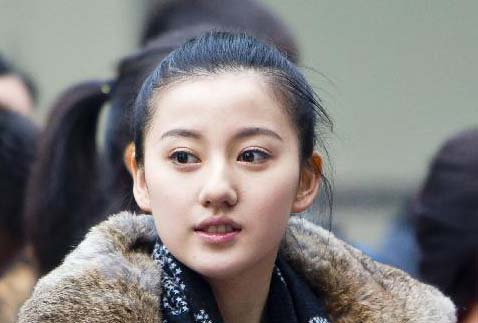 Second round of test kicks off at Beijing Film Academy
Second round of test kicks off at Beijing Film Academy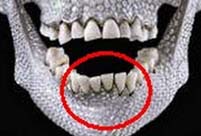 Ancient Qiang people had vertically grown teeth
Ancient Qiang people had vertically grown teeth Top 10 Chinese youth’s favorite seaside destinations
Top 10 Chinese youth’s favorite seaside destinations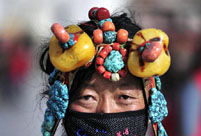 Traditional Tibetan clothing tailors
Traditional Tibetan clothing tailors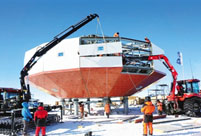 In photos: Unveiling Taishan station
In photos: Unveiling Taishan station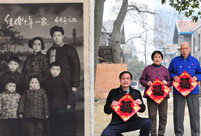 Beautiful moments of family reunion
Beautiful moments of family reunion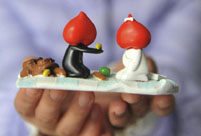 10 Valentine's Day ideas for couples
10 Valentine's Day ideas for couples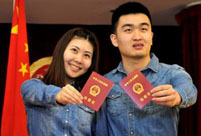 Let's get married today!
Let's get married today! Chinese warplanes C919 to appear at Singapore Airshow 2014
Chinese warplanes C919 to appear at Singapore Airshow 2014 Ruins of Shang Dynasty's structure unearthed in Shaanxi
Ruins of Shang Dynasty's structure unearthed in Shaanxi  Intercity high speed train in operation
Intercity high speed train in operation Severe coldness freezes large parts of China
Severe coldness freezes large parts of China  Beautiful moments of Sochi
Beautiful moments of Sochi  It's not just performing this year
It's not just performing this yearDay|Week|Month